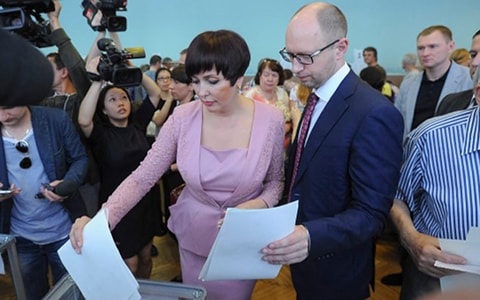Arseniy Yatsenyuk "flips the table": Ukraine enters a new crisis cycle?
(Baonghean) - Last week, international public opinion focused on the early election in Ukraine, because this could be an opportunity to stabilize the situation after a year or so since the crisis began. The people of Ukraine and many related countries were tired of the riots, uprisings and gunshots. However, when the election results were in favor of Prime Minister Arseniy Yatsenyuk's party and then the announcement of not forming an alliance with President Petro Poroshenko's bloc, public opinion was once again surprised by this quick "turnaround"...
 |
| Ukrainian Prime Minister Arseniy Yatsenyuk (right) votes at a polling station in Kiev (Photo: AFP) |
| RELATED NEWS |
|---|
On October 26, Ukrainians began voting, with 7,000 candidates from 29 political parties and movements participating, with 32,000 polling stations across Ukraine and 112 polling stations abroad opening to welcome 34 million voters to elect the 8th National Assembly. Accordingly, half of the 450 seats of the Ukrainian Parliament are elected according to the party list and the other half are elected according to the regions. However, among the 225 deputies elected according to the regional list as usual, there will be 26 deputies who have not been elected, including 10 deputies from Crimea, 2 deputies from Sevastopol (this peninsula has been annexed by Russia) and 14 deputies from the Donbass region. Pre-election polls show that incumbent President Petro Porochenko's bloc is leading with about 30% of support, followed by other pro-Western parties such as Prime Minister Arseniy Yatsenyuk's People's Front and former Prime Minister Ioulia Timochenko's Organization Party. This could create a major split among voters and promise an unpredictable election, however, according to analysts, no party will win a majority to form a government on its own.
As predicted by experts, the election results did not have any party winning absolutely, information about the vote counting process was published regularly in the media, showing how much attention was paid. While the vote counting was underway, the two leading parties, President Petro Poroshenko's bloc and Prime Minister Arseniy Yatsenyuk's People's Front, took turns to take the lead, but with a small gap. However, what experts never anticipated was Prime Minister Arseniy Yatsenyuk's "turnaround" after the official results were announced. The reason for saying "flip" is because before, during the election, the incumbent prime minister did not hesitate to mention the close alliance with President Petro Porochenko's bloc, but when the People's Front party won, Prime Minister Yatsenyuk came up with his own plan when he proposed an alliance with the Self-Reliance Party of Lvov Mayor Andriy Sadovy, the Fatherland Party of former Ukrainian Prime Minister Yulia Tymoshenko and the Radical Party. He named this alliance "European Ukraine". It can be seen that these are mostly right-wing parties known as extremist armed groups mainly engaged in protests. This raises concerns for the uncertain future awaiting not only the separatist forces demanding independence but also the large Russian-speaking community in Eastern and Southern Ukraine. The question is why was there such a quick flip? According to analysts, although Petro Poroshenko is completely inclined towards the West, at this point, his political bloc is still considered to have the most peaceful orientation. On the contrary, the People's Front party does not hide its intention to be "tough" and "fight to the end" with the separatists in the East. Because Prime Minister Yatsenyuk has affirmed that the new government must continue to fight for the country, that is, maintain the civil war. In addition, the reasons are no less important: President Poroshenko wants a close ally from the same hometown of Vinnytsia and a Deputy Prime Minister - Mr. Volodymyr Groysman to replace Yatsenyuk as Prime Minister of Ukraine, and then who will head the ministries... All of these reasons are the answer to why, as soon as he won the parliamentary election, Prime Minister Arseniy Yatsenyuk "turned the table" quickly.
The election that was hoped to defuse the crisis in Ukraine has ended, with Arseniy Yatsenyuk winning. But the hope for measures to bring peace to Ukraine has almost come to a dead end, when the current prime minister chose a coalition of far-right parties to form a government. Is this a somewhat uncalculated choice, because no one can confirm that this coalition always looks in the same direction? And if that happens, it means that there are opposing views on policy as well as interests, within this "European Ukraine" alliance there will certainly be problems, even hostility, because they are representatives of the far-right. Moreover, there is one thing that Arseniy Yatsenyuk also needs to note: a coalition that leans heavily towards the West may have some immediate benefits. Not to mention the long-term or medium-term strategy, just in the immediate future, when winter is approaching, when the bitter cold and snowstorms fall across the vast territory of Europe, the lack of Russian gas supply makes the price of this commodity become scarce. Then even the Western allies will find it difficult to extend a helping hand, because currently even Europe cannot find any solution to reduce its dependence on Russian gas supply. And thus, a cycle of crisis can begin again in Ukraine with new tensions and hostilities…?.
Southern Scenery






